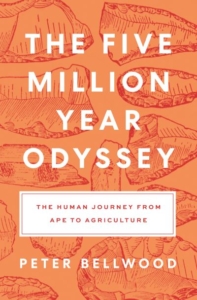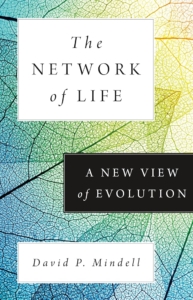“The Human Journey From Ape to Agriculture” with Professor Peter Bellwood
Over a span of five million years, humankind rose from modest origins to become the planet’s most dominant species. Along the way, people changed a lot in how they looked, spoke, and lived. But how did all this happen? The variety we see in humans today is the result of evolution—which began shaping the Homo group about 2.5 million years ago—and migration, as humans moved into new places. In his book “The Five-Million-Year Odyssey: The Human Journey from Ape to Agriculture” Professor Peter Bellwood brings together research from archaeology, biology, anthropology, and language studies to tell the story of human history. He takes us from the earliest hominins in Africa, through the spread of humans across the continents, to the start of farming and rapid population growth. He introduces early human relatives like the australopithecines, Homo erectus, and Neanderthals, then focuses on the rise of Homo sapiens about 300,000 years ago and their journey into Eurasia, Australia, and the Americas. Bellwood also looks at how farming, which began around 10,000 years ago, helped people move to new lands and share their languages and cultures. In this episode of Bridging the Gaps, I speak with Professor Peter Bellwood.
Peter Bellwood is professor emeritus at the Australian National University. He specialises in the human population prehistory from archaeological, linguistic and biological perspectives. His many books include “First Migrants: Ancient Migration in Global Perspective” and “First Farmers: The Origins of Agricultural Societies. He is the winner of the 2021 International Cosmos Prize.
We begin by discussing how studying languages uncovers our past and tells the story of humans. Language families act like maps, pointing to early journeys of people. Shared words that appear in many tongues offer strong clues about those first moves. Next we look at what ancient DNA and proteins can say about our past. I first ask about the hard job of finding and testing old genetic samples. After that we turn to classic archaeology, and I ask Peter about digging at historic sites. We dive into how a creature unlike any other animal arose, and we touch upon the blank spots that still puzzle us. The book’s idea of “man the tool maker” comes up: does making tools really set us apart? We talk about that in depth.
We then explore the rise and later disappearance of Neanderthals and other early human groups. Our focus shifts to the cultural growth of Homo sapiens, tracing the path from hunting and gathering to more organised farming. We look closely at the first waves of people who moved in search of richer soil and safer homes. The Fertile Crescent in the Middle East gets special attention, as we track the birth of stable villages and maybe the first cities. We also discuss the boats, paths, and simple gear that helped early travellers to travel long distances.
Shifting dates and fresh finds force us to keep revising the human timeline. We talk about lively cultures that either vanished overnight or slowly faded away. From start to end, the talk has been rich, clear, and full of insights.
Complement this discussion with How Cooking Made Us Human with Professor Richard Wrangham and then listen to “From Sensing to Sentience: How Feeling Emerges from the Brain” with Professor Todd Feinberg




Connect With Us